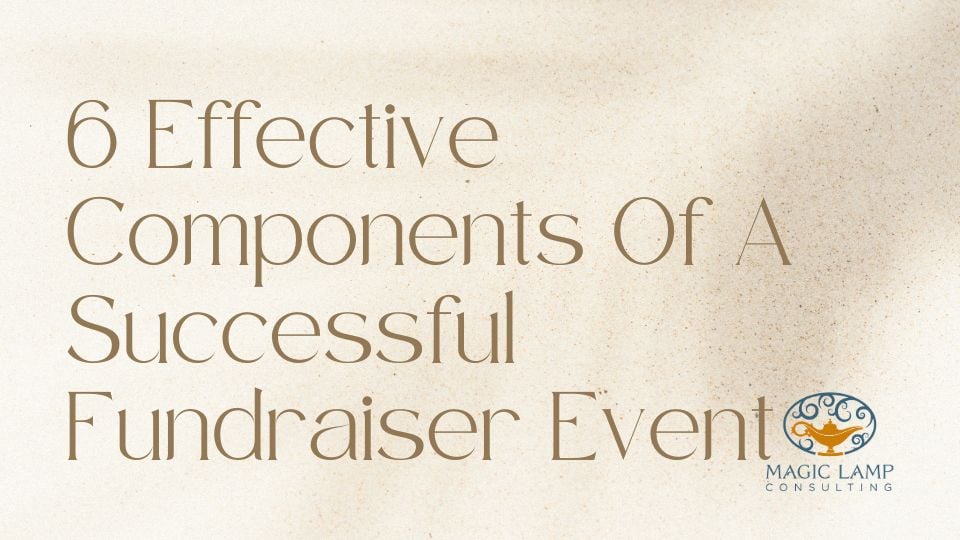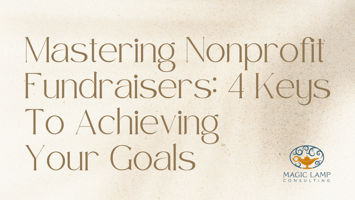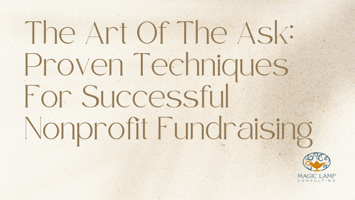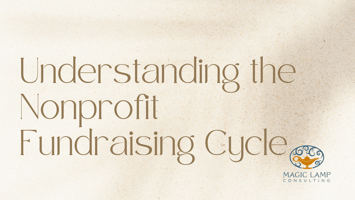In the nonprofit world, fundraising plays an important component in each organization's financial...
6 Effective Components of a Successful Fundraiser Event
Fundraiser events play a vital role in supporting causes and nonprofit organizations. They bring people together for a common purpose while raising funds to create a positive impact. Organizing a successful fundraiser event requires careful planning and strategic thinking. In this blog post, we will explore six effective components that contribute to the success of such events, helping you create an unforgettable experience for attendees and achieve your fundraising goals.
Clearly Defined Purpose and Goal
Every successful fundraiser event starts with a clearly defined purpose and goal. Whether supporting a charitable organization, funding a specific program, or addressing a social issue, a well-defined purpose provides focus. In addition, it helps you effectively communicate with potential donors and attendees. Next, set measurable goals, such as the amount of funds you intend to raise, and establish a compelling narrative showcasing the impact of their contributions.
Effective Planning and Organization
Successful fundraisers require meticulous planning and organization. Create a dedicated team responsible for different aspects of the event, including venue selection, budgeting, marketing, logistics, and volunteer management. Establish a timeline with key milestones to ensure tasks are completed on time. Allocate responsibilities to team members based on their strengths and expertise, fostering a collaborative environment that encourages innovation and efficiency.
Engaging and Targeted Marketing
Fundraiser events need effective marketing strategies to attract attendees and donors. Leverage various channels, including social media, email marketing, press releases, and partnerships with local media outlets. Craft compelling messages highlighting the event’s purpose, goals, and impact. Personalize your marketing efforts by targeting specific demographics or communities that align with your cause. Utilize engaging visuals, videos, and testimonials to create an emotional connection with your audience and inspire them to get involved.
Engrossing Event Program and Activities
A successful fundraiser event should captivate attendees from start to finish. Design an engaging program with inspiring speeches, impactful presentations, interactive activities, and entertainment. Incorporate storytelling elements that highlight the individuals or communities the nonprofit serves. Feature guest speakers, celebrities, or influencers who have a connection to your cause to enhance the event’s appeal. Additionally, consider incorporating auctions, raffles, or unique experiences to encourage participation and generate additional funds.
Seamless Fundraising Mechanisms
Facilitating seamless and convenient ways for attendees to contribute is essential. Set up multiple donation options, including online platforms, mobile apps, or traditional methods like cash or check. Display clear instructions and provide dedicated staff or volunteers to assist donors with queries. Utilize technology such as QR codes or digital payment systems to streamline the process. Publicly recognize and express gratitude for the contributions made, reinforcing their donations’ impact. This not only encourages current donors but also inspires others to contribute.
Post-Event Evaluation and Appreciation
After the event, take time to evaluate its success. Review the financial outcomes, attendee feedback, and overall impact on your cause. Collect testimonials and stories from participants and beneficiaries to showcase the event’s success and motivate future donors. Express gratitude and appreciation to all attendees, sponsors, volunteers, and partners through personalized thank-you messages or appreciation events. Use this feedback to identify areas for improvement and incorporate them into future fundraisers, ensuring continuous growth and development.
Successful fundraiser events result from careful planning, effective marketing, engaging programs, and seamless execution. By focusing on these essential components, you can create an event that not only raises funds but builds a strong community of supporters who share your passion for making a positive impact in the world.
Clearly Defined Purpose and Goal
Every successful fundraiser event starts with a clearly defined purpose and goal. Whether supporting a charitable organization, funding a specific program, or addressing a social issue, a well-defined purpose provides focus. In addition, it helps you effectively communicate with potential donors and attendees. Next, set measurable goals, such as the amount of funds you intend to raise, and establish a compelling narrative showcasing the impact of their contributions.
Effective Planning and Organization
Successful fundraisers require meticulous planning and organization. Create a dedicated team responsible for different aspects of the event, including venue selection, budgeting, marketing, logistics, and volunteer management. Establish a timeline with key milestones to ensure tasks are completed on time. Allocate responsibilities to team members based on their strengths and expertise, fostering a collaborative environment that encourages innovation and efficiency.
Engaging and Targeted Marketing
Fundraiser events need effective marketing strategies to attract attendees and donors. Leverage various channels, including social media, email marketing, press releases, and partnerships with local media outlets. Craft compelling messages highlighting the event’s purpose, goals, and impact. Personalize your marketing efforts by targeting specific demographics or communities that align with your cause. Utilize engaging visuals, videos, and testimonials to create an emotional connection with your audience and inspire them to get involved.
Engrossing Event Program and Activities
A successful fundraiser event should captivate attendees from start to finish. Design an engaging program with inspiring speeches, impactful presentations, interactive activities, and entertainment. Incorporate storytelling elements that highlight the individuals or communities the nonprofit serves. Feature guest speakers, celebrities, or influencers who have a connection to your cause to enhance the event’s appeal. Additionally, consider incorporating auctions, raffles, or unique experiences to encourage participation and generate additional funds.
Seamless Fundraising Mechanisms
Facilitating seamless and convenient ways for attendees to contribute is essential. Set up multiple donation options, including online platforms, mobile apps, or traditional methods like cash or check. Display clear instructions and provide dedicated staff or volunteers to assist donors with queries. Utilize technology such as QR codes or digital payment systems to streamline the process. Publicly recognize and express gratitude for the contributions made, reinforcing their donations’ impact. This not only encourages current donors but also inspires others to contribute.
Post-Event Evaluation and Appreciation
After the event, take time to evaluate its success. Review the financial outcomes, attendee feedback, and overall impact on your cause. Collect testimonials and stories from participants and beneficiaries to showcase the event’s success and motivate future donors. Express gratitude and appreciation to all attendees, sponsors, volunteers, and partners through personalized thank-you messages or appreciation events. Use this feedback to identify areas for improvement and incorporate them into future fundraisers, ensuring continuous growth and development.
Successful fundraiser events result from careful planning, effective marketing, engaging programs, and seamless execution. By focusing on these essential components, you can create an event that not only raises funds but builds a strong community of supporters who share your passion for making a positive impact in the world.





